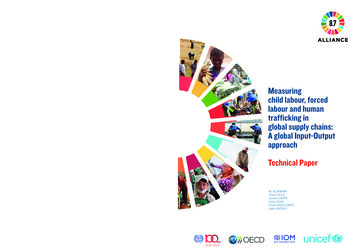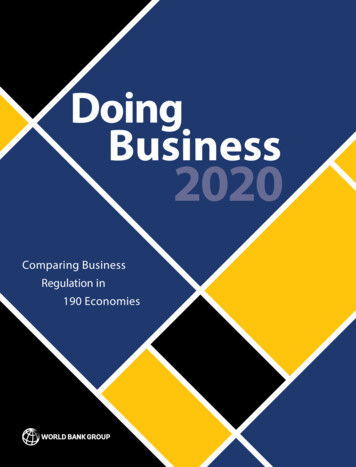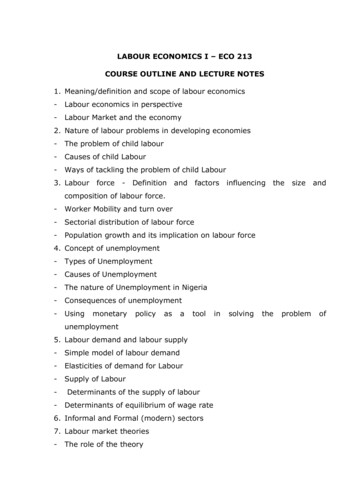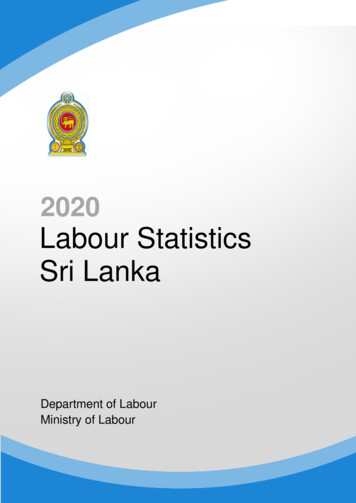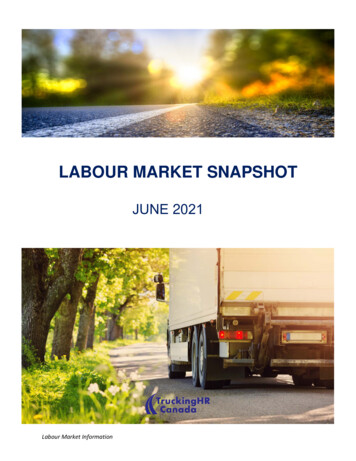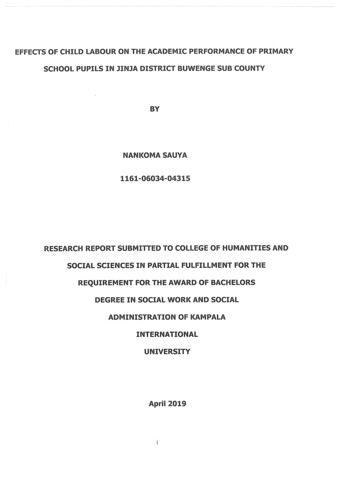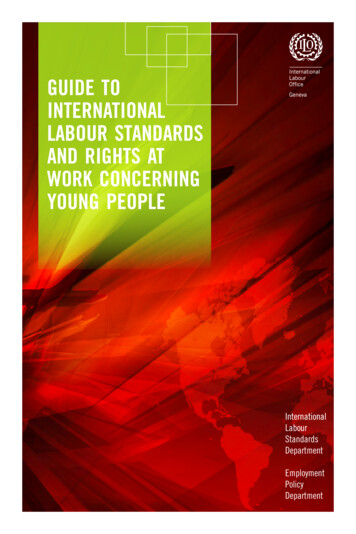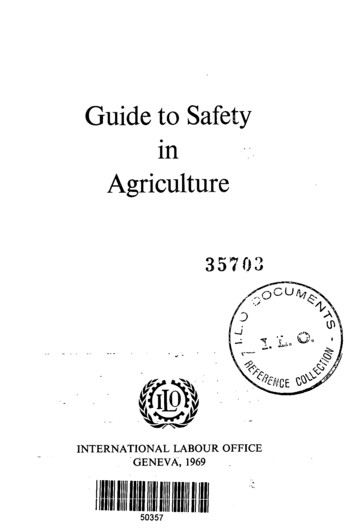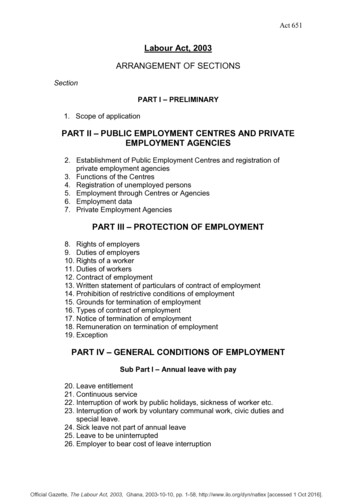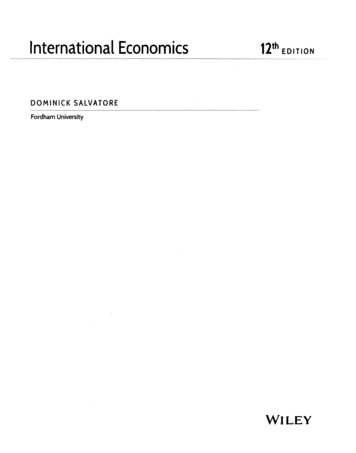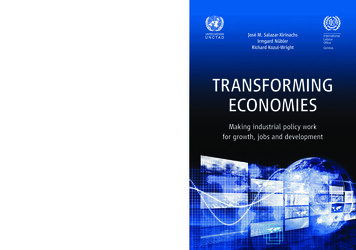
Transcription
SalazarXirinachsNüblerKozulWrightThe book contains analyses of national and sectoral experiences in Costa Rica,the Republic of Korea, India, Brazil, China, South Africa, sub-Saharan Africaand the United States. Practical lessons and fundamental principles for industrial policy design and implementation are distilled from the country casestudies. Given the fact that many countries engage in industrial policy today,this collection of contributions on theory and practice can be helpful to policymakers and practitioners in making industrial policy work for growth, jobs anddevelopment.Making industrial policy work for growth, jobs and developmentBuilding on a description and assessment of the contributions of differenteconomic traditions (neoclassical, structural, institutional and evolutionaryeconomics) to the analysis of policies in support of structural transformationand the generation of productive jobs, this book argues that industrial policygoes beyond targeting preferred economic activities, sectors and technologies. It also includes the challenge of accelerating learning and the creationof productive capabilities. This perspective encourages a broad and integratedapproach to industrial policy. Only a coherent set of investment, trade, technology, education and training policies supported by macroeconomic, financialand labour market policies can adequately respond to the myriad challenges oflearning and structural transformation faced by countries aiming at achievingdevelopment objectives.TRANSFORMING ECONOMIESNo country has made the arduous journey from widespread rural poverty topost-industrial wealth without employing targeted and selective governmentpolicies to modify its economic structure and boost its economic dynamism.ILOJosé M. Salazar-XirinachsIrmgard NüblerRichard Kozul-WrightTRANSFORMINGECONOMIESMaking industrial policy workfor growth, jobs and development
TRANSFORMING ECONOMIESMaking industrial policy workfor growth, jobs and developmentContents
TRANSFORMING ECONOMIESMaking industrial policy workfor growth, jobs and developmentINTERNATIONAL LABOUR OFFICE · GENEVAContents
Copyright International Labour Organization 2014First published 2014Publications of the International Labour Office enjoy copyright under Protocol 2 of the Universal Copyright Convention. Nevertheless, short excerpts from them may be reproduced without authorization, oncondition that the source is indicated. For rights of reproduction or translation, application should bemade to ILO Publications (Rights and Permissions), International Labour Office, CH-1211 Geneva 22,Switzerland, or by email: pubdroit@ilo.org. The International Labour Office welcomes such applications.Libraries, institutions and other users registered with reproduction rights organizations may make copies inaccordance with the licences issued to them for this purpose. Visit www.ifrro.org to find the reproductionrights organization in your country.Salazar-Xirinachs, José Manuel; Nübler, Irmgard; Kozul-Wright, RichardTransforming economies: Making industrial policy work for growth, jobs and developmentJosé Manuel Salazar-Xirinachs, Irmgard Nübler and Richard Kozul-Wright (editors)International Labour Office. – Geneva: ILO, 2014ISBN 978-92-2-128565-6 (print)ISBN 978-92-2-128566-3 (web pdf)International Labour OfficeContentsindustrial policy / industrial development / catching-up growth / structural transformation /capabilities/ learning strategies / employment / productive jobs / economic development /developed countries / developing countries /08.01.2ILO Cataloguing in Publication DataThe designations employed in ILO publications, which are in conformity with United Nations practice,and the presentation of material therein do not imply the expression of any opinion whatsoever on thepart of the International Labour Office concerning the legal status of any country, area or territory or ofits authorities, or concerning the delimitation of its frontiers.The responsibility for opinions expressed in signed articles, studies and other contributions rests solely withtheir authors, and publication does not constitute an endorsement by the International Labour Office ofthe opinions expressed in them.Reference to names of firms and commercial products and processes does not imply their endorsementby the International Labour Office, and any failure to mention a particular firm, commercial product orprocess is not a sign of disapproval.ILO publications and electronic products can be obtained through major booksellers or ILO local officesin many countries, or direct from ILO Publications, International Labour Office, CH-1211 Geneva 22,Switzerland. Catalogues or lists of new publications are available free of charge from the above address, orby email: pubvente@ilo.orgVisit our web site: www.ilo.org/publnsThis publication was produced by the Document and Publications Production,Printing and Distribution Branch (PRODOC) of the ILO.Graphic and typographic design, manuscript preparation, copy editing, layoutand composition, proofreading, printing, electronic publishing and distribution.PRODOC endeavours to use paper sourced from forests managedin an environmentally sustainable and socially responsible manner.Code: CPG-WEI-GEN
ContentsEditors and Contributors . . . . . . . . . . . . . . . . . . . . . . . . . . . . . . . . . . . .Acknowledgements . . . . . . . . . . . . . . . . . . . . . . . . . . . . . . . . . . . . . . .List of abbreviations . . . . . . . . . . . . . . . . . . . . . . . . . . . . . . . . . . . . . . .xixixxxiIntroductionI ndustrial policy, productive transformationand jobs: Theory, history and practice . . . . . . . . . . . . . . . . . . . . . .José Manuel Salazar-Xirinachs, Irmgard Nübler and Richard Kozul-Wright1Part I. Productive transformation: Models and policies1. Latin American structuralism and productiondevelopment strategies . . . . . . . . . . . . . . . . . . . . . . . . . . . . . . .José Antonio Ocampo1.1 Introduction . . . . . . . . . . . . . . . . . . . . . . . . . . . . . . . . . . . . . .1.2 ECLAC, macroeconomic analysis and structural change . . . . . .1.3 Economic growth and structural change . . . . . . . . . . . . . . . . .1.4 Conclusions . . . . . . . . . . . . . . . . . . . . . . . . . . . . . . . . . . . . . .2. Making industrial policy work for development . . . . . . . . . . . . . .Justin Yifu Lin and Volker Treichel2.1 Fostering economic growth in developing countries:The evolution of development thinking . . . . . . . . . . . . . . . . . . .2.2 What are the principal tenets of successful industrial policy? . .2.3 Concluding remarks . . . . . . . . . . . . . . . . . . . . . . . . . . . . . . . .414142476065667276vContents
Transforming economies3. The role of industrial and exchange rate policies in promotingstructural change, productivity and employment . . . . . . . . . . . .Rodrigo Astorga, Mario Cimoli and Gabriel Porcile3.1 Introduction . . . . . . . . . . . . . . . . . . . . . . . . . . . . . . . . . . . . . .3.2 Employment, structural change and growthin developing economies . . . . . . . . . . . . . . . . . . . . . . . . . . . .3.3 Patterns of structural change, growth and employmentin the manufacturing sector . . . . . . . . . . . . . . . . . . . . . . . . . .3.4 Where do workers go? Aggregate productivityand employment . . . . . . . . . . . . . . . . . . . . . . . . . . . . . . . . . .3.5 Concluding remarks . . . . . . . . . . . . . . . . . . . . . . . . . . . . . . . .Appendix . . . . . . . . . . . . . . . . . . . . . . . . . . . . . . . . . . . . . . . . . . . .4. A theory of capabilities for productive transformation:Learning to catch up . . . . . . . . . . . . . . . . . . . . . . . . . . . . . . . . .Irmgard Nübler4.1 Introduction . . . . . . . . . . . . . . . . . . . . . . . . . . . . . . . . . . . . . .4.2 A dynamic concept of catching up . . . . . . . . . . . . . . . . . . . . .4.3 A knowledge-based concept of capabilities . . . . . . . . . . . . . . .4.4 A concept of collective learning . . . . . . . . . . . . . . . . . . . . . . . .4.5 Design and implementation of learning strategies . . . . . . . . . .4.6 Conclusions . . . . . . . . . . . . . . . . . . . . . . . . . . . . . . . . . . . . . .5. Industrial policy in the era of vertically specialized industrializationWilliam Milberg, Xiao Jiang and Gary Gereffi5.1 Introduction . . . . . . . . . . . . . . . . . . . . . . . . . . . . . . . . . . . . . .5.2. Trade in intermediates, vertical specializationand upgrading . . . . . . . . . . . . . . . . . . . . . . . . . . . . . . . . . . . .5.3 Industrial policy after the Washington Consensus . . . . . . . . . . .5.4 Industrial policy and the challenges of VSI . . . . . . . . . . . . . . . .5.5 Conclusions . . . . . . . . . . . . . . . . . . . . . . . . . . . . . . . . . . . . . 64170173Contents
ContentsPart II. Rethinking industrial development strategies:The capabilities dimension6. Industrial development strategies in Costa Rica: When structuralchange and domestic capability accumulation diverge . . . . . . . . 181Eva Paus6.1 Introduction . . . . . . . . . . . . . . . . . . . . . . . . . . . . . . . . . . . . . .1816.2 The development of technological capabilities in small latecomersin the time of globalization: Analytical considerations . . . . . . . . 1836.3 The uneven accumulation of technological capabilities185in Costa Rica under ISI . . . . . . . . . . . . . . . . . . . . . . . . . . . . . .6.4 Structural change and domestic capabilitiesunder the new economic model: Diverging trajectories . . . . . . . 1906.5 Social capability accumulation under the new economic model:Falling behind private sector needs . . . . . . . . . . . . . . . . . . . . . 2006.6 Conclusions . . . . . . . . . . . . . . . . . . . . . . . . . . . . . . . . . . . . . . 2057. Skills development strategies and the high roadto development in the Republic of Korea . . . . . . . . . . . . . . . . . .Byung You Cheon7.1 Introduction . . . . . . . . . . . . . . . . . . . . . . . . . . . . . . . . . . . . . .7.2 Economic development and skills development . . . . . . . . . . . .7.3 Government policy on education and training . . . . . . . . . . . . .7.4 New challenges call for new responses . . . . . . . . . . . . . . . . . .7.5 Policy implications . . . . . . . . . . . . . . . . . . . . . . . . . . . . . . . . .8. Building capabilities in the software service industryin India: Skill formation and learning of domesticenterprises in value chains . . . . . . . . . . . . . . . . . . . . . . . . . . . . .Manimegalai Vijayabaskar and M. Suresh Babu8.1 Introduction . . . . . . . . . . . . . . . . . . . . . . . . . . . . . . . . . . . . . .8.2 The Indian software industry: Trajectories of growthand upgrading in global value chains . . . . . . . . . . . . . . . . . . . .8.3 Skills, knowledge and information requirementsin the software sector and organizational capabilities . . . . . . . .8.4 The evolution of a knowledge structure: Public policyand public–private response . . . . . . . . . . . . . . . . . . . . . . . . . .8.5 Procedures for developing knowledge and skillsrequired in labour markets . . . . . . . . . . . . . . . . . . . . . . . . . . .213213214220225235239239241244248252viiContents
Transforming economies8.6 Process upgrading through standards: Legislative governancefor quality, procedures and firm routines . . . . . . . . . . . . . . . . .8.7 The role of institutional networks in enhancing capabilities . . . .8.8 Conclusions and implications for sustained upgrading . . . . . . .9. Export sophistication, growth and the middle-income trap . . . . .Piergiuseppe Fortunato and Carlos Razo9.1 Introduction . . . . . . . . . . . . . . . . . . . . . . . . . . . . . . . . . . . . . .9.2 Export sophistication index:Methodology and descriptive statistics . . . . . . . . . . . . . . . . . .9.3 Suggestive growth regression . . . . . . . . . . . . . . . . . . . . . . . . .9.4 The degree of export sophistication as a Markov process:Methodology and results . . . . . . . . . . . . . . . . . . . . . . . . . . . .9.5 Concluding remarks . . . . . . . . . . . . . . . . . . . . . . . . . . . . . . . .Annex . . . . . . . . . . . . . . . . . . . . . . . . . . . . . . . . . . . . . . . . . . . . . . .255258262267267271275277281284Part III. Industrial policy in the making:Design and implementation10. Industrial policy as an effective development tool:Lessons from Brazil . . . . . . . . . . . . . . . . . . . . . . . . . . . . . . . . . .João Carlos Ferraz, David Kupfer, Felipe Silveira Marques10.1 Industrial policy is back in the game . . . . . . . . . . . . . . . . . . . .10.2 Persistent challenges of an industrial policy . . . . . . . . . . . . . . .10.3 Flexible continuity: An account of the recent Brazilian experience10.4 Development bank: A strategic asset of industrial policies . . . .10.5 Conclusions . . . . . . . . . . . . . . . . . . . . . . . . . . . . . . . . . . . . . .11. The State and industrial policy in Chineseeconomic development . . . . . . . . . . . . . . . . . . . . . . . . . . . . . . .Dic Lo and Mei Wu11.1. Introduction . . . . . . . . . . . . . . . . . . . . . . . . . . . . . . . . . . . . . .11.2. Stylized facts of Chinese economic transformationand implications . . . . . . . . . . . . . . . . . . . . . . . . . . . . . . . . . . .11.3 The strength and limitation of state industrial policy in action . .11.4 State orientation: Market reform, economic growth and labour .11.5 Conclusions . . . . . . . . . . . . . . . . . . . . . . . . . . . . . . . . . . . . . .viii291291292297302304307307308314321325Contents
Contents12. Industrial policy in a harsh climate: The case of South Africa . . .Nimrod Zalk12.1 Introduction . . . . . . . . . . . . . . . . . . . . . . . . . . . . . . . . . . . . . .12.2 The importance of manufacturing and the needfor industrial policy . . . . . . . . . . . . . . . . . . . . . . . . . . . . . . . . .12.3 Apartheid-era industrialization . . . . . . . . . . . . . . . . . . . . . . . .12.4 Washington Consensus conforming policy (1994–2007) . . . . .12.5 Industrial policy since 2007: National Industrial PolicyFramework (NIPF) and Industrial Policy Action Plan (IPAP) . . .12.6 Implementation of NIPF and IPAP: Progress and constraints . .12.7 Conclusions . . . . . . . . . . . . . . . . . . . . . . . . . . . . . . . . . . . . . .32713. Kick-starting industrial transformation in sub-Saharan Africa . . .Tilman Altenburg and Elvis Melia13.1 Introduction . . . . . . . . . . . . . . . . . . . . . . . . . . . . . . . . . . . . . .13.2 High growth, slow structural change: The needfor industrial policy in sub-Saharan Africa . . . . . . . . . . . . . . . .13.3 Governance capacities for successful industrial policy . . . . . . .13.4 The way forward . . . . . . . . . . . . . . . . . . . . . . . . . . . . . . . . . . .13.5 Conclusions . . . . . . . . . . . . . . . . . . . . . . . . . . . . . . . . . . . . . .35514. The paradox of US industrial policy:The developmental state in disguise . . . . . . . . . . . . . . . . . . . . .Robert H. Wade14.1 The rejection of US industrial policy:Ideological and political economy arguments . . . . . . . . . . . . . .14.2 A brief history of the US developmental state . . . . . . . . . . . . . .14.3 The emergence of the network developmental state . . . . . . . . .14.4 Examples of network creation and maintenance . . . . . . . . . . .14.5 Evaluation of network-building industrial policy . . . . . . . . . . . .14.6 Conclusions . . . . . . . . . . . . . . . . . . . . . . . . . . . . . . . . . . . . . 90393396ixContents
Editors and ContributorsContentsEditorsRichard Kozul-Wright is Director of the Globalization and Development StrategiesDivision at UNCTAD. He has worked at the United Nations in both New Yorkand Geneva. He holds a PhD in Economics from the University of Cambridge,UK, and has published widely on economic issues in, inter alia, The EconomicJournal, the Cambridge Journal of Economics, The Journal of Development Studiesand the Oxford Review of Economic Policy. His latest book is The Resistible Rise ofMarket Fundamentalism (with Paul Rayment) and he has also edited volumes onTransnational Corporations and the Global Economy, Economic Insecurity andDevelopment, Securing Peace, and Climate Protection and Development.Irmgard Nübler has been a Senior Economist at the ILO in Geneva since 2004.She currently coordinates the work programme on productive transformation, jobsand industrial policies. Before joining the ILO, she held a position as Professor ofEconomics at the Free University of Berlin for 13 years. She conducted research atthe Massachusetts Institute of Technology in Boston, the Institute for DevelopmentStudies at the University of Nairobi and the International Institute for LabourStudies, ILO, Geneva, and worked as a consultant for various national and international development agencies. She received her PhD in Economics from theFree University of Berlin. She has published in the areas of economic and industrial policy, globalization, technology, education, training, informal economy andhuman development. Her forthcoming book is titled Capabilities, productive transformation and development: A new perspective on industrial policies.xi
Transforming economiesJosé Manuel Salazar-Xirinachs (PhD, Cambridge University, UK) has beenAssistant-Director General for Policy at the ILO since March 2013. Prior to that,from August 2005 to February 2013, he was Executive Director for Employment.Before joining the ILO, he served as Director of the Office of Trade, Growthand Competitiveness at the Organization of American States (OAS), supportingthe countries of the Americas in their negotiations of the Free Trade Area of theAmericas (FTAA) (1998–2005); Minister of Foreign Trade of Costa Rica (1997–98); Chief Economist and later Executive Director of the Federation of PrivateEntities of Central America and Panama (1990–97); member of the Board ofDirectors of the Central Bank of Costa Rica (1995–97); and Executive Presidentof the Costa Rican Development Corporation (1988–90). He is the author ofnumerous journal articles on development, trade and competitiveness policies andhas written and edited several books, including: Towards free trade in the Americas(Brookings Institution, 2001), Promoting sustainable enterprises (ILO, 2008), andTrade and employment: From myths to facts (ILO, 2011).ContentsContributorsTilman Altenburg is Head of the Competitiveness and Social DevelopmentDepartment at the German Development Institute (DIE), which is the government-funded think-tank for development policy in Germany. Before joining DIEin 1995, he was a research fellow of the Latin American Institute of the FreeUniversity Berlin and the Philipps University Marburg. He received his doctoratein Economic Geography from the University of Hamburg, Germany, in 1991. Since1986, he has undertaken empirical research on issues of economic development inLatin America, Asia and Africa, with a focus on competitiveness, industrial andinnovation policy, small and medium enterprises promotion and value chain development. Currently, he is coordinating several international research projects onlow-carbon industrial policy in developing countries. He regularly publishes academic papers on these issues, and works as an advisor to the German Governmentand international development agencies.Rodrigo Astorga has worked as a consultant in the Division of Production,Productivity and Management and currently in the Division of Social Developmentof the Economic Commission for Latin America and the Caribbean since 2011.He completed his undergraduate and graduate studies at the University of Chile,where he has worked as a research assistant since 2008. He is also co-author, withJorge Katz, of a chapter in the book National innovation systems, social inclusion anddevelopment: The Latin American experience (LALICS).xii
Editors and ContributorsM. Suresh Babu is Associate Professor at the Department of Humanities andSocial Sciences, Indian Institute of Technology, Madras, India. His research is onIndia’s industrial development, applied macroeconomics and trade and development. He is the co-author of What and how do Indian firms innovate? (Macmillan,2010). He has published articles on various aspects of India’s industrial development in leading national and international journals and popular media.Byung You Cheon has been a Professor at Hanshin University, Republic of Korea,since 2009. He received his PhD in Economics from Seoul National University andhas worked as a research fellow at the Korea Labour Institute for ten years. He haspublished books and articles in research areas of labour economics and social policies,including: A study of incentive problems of welfare state (2013), Drivers of income inequality in Korea (2012), and Economic Crisis and Labour in Korea (2010, co-author).Mario Cimoli is Director of the Division of Production, Productivity and Management at the United Nations Economic Commission for Latin America andthe Caribbean and Professor of Economics at the University of Venice (Ca’ Foscari).In 2004 he was appointed Co-Director of two task forces: Industrial Policy,and Intellectual Property Rights Regimes for Development (Initiative for PolicyDialogue, Columbia University, New York). He was awarded the Philip MorrisChair of International Business (2004) at the Sant’Anna School of AdvancedStudies, University of Pisa. He gives talks, writes and publishes books and articles on economic and industrial policy issues, science, technology and innovation.João Carlos Ferraz is Executive Director of the Brazilian Development Bank(BNDES). His areas of responsibility include Economic Research, CorporatePlanning and Risk Management. He is the BNDES representative at the ExecutiveSecretariat of the Brazilian Industrial Policy. He is also Professor, on leave, at theInstituto de Economia, Universidade Federal do Rio de Janeiro, and Officer, onleave, at the United Nations Economic Commission for Latin America and theCaribbean. He holds a Doctorate in Philosophy from the University of Sussex. Hehas published more than 50 articles in books and academic journals.Piergiuseppe Fortunato is currently an economist at the United NationsConference for Trade and Development. Before joining UNCTAD, he was aneconomist with the Department of Economic and Social Affairs of the UnitedNations. Previously, he held the position of Assistant Professor in Economics at theUniversity of Bologna and carried out research at the Université Paris-1 Panthéon–Sorbonne as a research fellow. His research interests include political economy andlong-term growth, economic development and South–South integration. In thesefields he has published in such journals as The Economic Journal, The B.E. Journalof Theoretical Economics and the Global Policy.xiiiContents
Transforming economiesGary Gereffi is Professor of Sociology and Director of the Center on Globalization,Governance and Competitiveness at Duke University. He has published numerousbooks and articles on globalization, industrial upgrading, and social and economicdevelopment in various parts of the world, including: Global value chains in a postcrisis world: A development perspective (World Bank, 2010) and Shifting end markets and upgrading prospects in global value chains (special issue of the InternationalJournal of Technological Learning, Innovation and Development, 2011). He recentlycompleted a three-year “Capturing the Gains” research project, and is currentlyworking on global value chains in a post-Washington Consensus world and the roleof industrial policies in emerging economies.Xiao Jiang is currently an Assistant Professor of Economics at Denison University,Granville, Ohio, USA, and a consultant for the ILO. Previously, he was a juniorresearch officer in the ILO’s Policy Integration Department. He received hisDoctorate degree in Economics from the New School for Social Research in NewYork. His research focuses on international trade and development, global valuechains analysis, and classical political economy.David Kupfer has a PhD in Economics from the Universidade Federal do Rio deJaneiro (1998). He is currently an Associate Professor of the Instituto de Economiada Universidade Federal do Rio de Janeiro (IE/UFRJ), Brazil, where he coordinatesthe Research Group on Industry and Competitiveness. Among other activities, heis editor of the REC – Journal of Contemporary Economic of IE/UFRJ, a memberof the Economic Council of the Federação das Indústrias do Estado de São Pauloand columnist of the newspaper Valor Econômico. He is Advisor to the President’sOffice at the Brazilian Development Bank.Dic Lo is a Reader in Economics at the School of Oriental and African Studies,University of London, UK. He is also Co-Director of the Center of Research inPolitical Economy at Renmin University of China. His recent publications includeAlternatives to neoliberal globalization: Studies in the political economy of institutionsand late development (Basingstoke and London, Palgrave Macmillan, 2011).Elvis Melia is a PhD candidate at the University of Duisburg-Essen, Germany. Hisresearch focuses on institutional changes and industrial policy outcomes in subSaharan Africa. Currently, he is examining the industrial policy strategies of Kenya’snewly created counties (field research funded by the Friedrich Ebert Foundation(FES)). He holds a Bachelor’s degree in Political Science and a Master’s degree inInternational Relations and Development Politics – both from the University ofDuisburg-Essen.xivContents
Editors and ContributorsWilliam Milberg is Dean and Professor of Economics at the New School forSocial Research. His research focuses on the relationship between globalizationand income distribution and on the history and philosophy of economics. He hasworked as a consultant to the UNDP, the ILO, UNCTAD and the World Bank.He is the author (with Deborah Winkler) of Outsourcing economics: Global valuechains in capitalist development (Cambridge University Press).Irmgard Nübler (see above)José Antonio Ocampo is Director of the Economic and Political DevelopmentConcentration and a fellow of the Committee on Global Thought at ColumbiaUniversity. In 2008–10 he also served as co-Director of the UNDP/OAS Projecton “Agenda for a Citizens’ Democracy in Latin America”, and in 2009 as amember of the Commission of Experts of the UN General Assembly on Reformsof the International Monetary and Financial System. He previously served ina number of positions in the United Nations, most notably as Under-SecretaryGeneral for Economic and Social Affairs (New York) and Executive Secretary ofECLAC, and in the Government of Colombia as Minister of Finance and PublicCredit, Chairman of the Board of the Central Bank of Colombia, Director of theNational Planning Department, Minister of Agriculture and Rural Development,and Executive Director of FEDESARROLLO. He obtained his PhD from YaleUniversity and has published extensively on macroeconomic theory and policy,international financial issues, economic and social development, internationaltrade, and Colombian and Latin American economic history. In 2008 he wasawarded the Leontief Prize for Advancing the Frontiers of Economic Thought.Eva Paus is Professor of Economics and Carol Hoffmann Collins Director of theMcCulloch Center for Global Initiatives at Mount Holyoke College, Massachusetts,USA. She is the author and editor of numerous books and articles on economicdevelopment and globalization. Her current research focuses on the middle-incometrap, the implications of the rise of China for the prospects for growth-inducingstructural change in other developing countries, and policy space for productivetransformation under globalization. Her latest book is Getting development right:Structural transformation, inclusion and sustainability in the post-crisis era (PalgraveMacmillan, 2013).Gabriel Porcile (PhD, LSE – University of London, 1995) is Economic Affairs Officerat the Economic Commission for Latin America and the Caribbean, Professor atBrazil’s Federal University of Paraná (UFPR) and Researcher at the National Councilfor Scientific and Technological Development (CNPq). He has published extensivelyin the field of economic development, technology and growth. His latest papersare “Technology, structural change and BOP-constrained growth: A structuralistxvContents
Transforming economiestoolbox”(Cambridge Journal of Economics, 2014, with Mario Cimoli) and “Economicgrowth and income distribution with heterogeneous preferences on the real exchangerate” ( Journal of Post-Keynesian Economics, 2013, with Gilberto Tadeu Lima).Carlos Razo is an economist in the Office of the Director of the Division onTechnology and Logistics of the United Nations Conference on Trade andDevelopment (UNCTAD). He has published and contributed to papers, articles,book chapters and reports on issues related to industrial organization, internationaleconomics and development. He started his career at the United Nations with theEconomic Commission for Latin America and the Caribbean (ECLAC), where hewas one of the main authors of the Foreign Direct Investment Report of the region.Before joining the United Nations, he worked in London for a leading Europeanconsulting firm specialized in competition policy, as a lecturer at the BelarusianState Economics University in Minsk, and prior to that as an industrial engineer inthe manufacturing sector in Mexico.Felipe Silveira Marques has a PhD in Industrial and Technological Economicsfrom the Economics Institute of the Federal University of Rio de Janeiro,
Printing and Distribution Branch (PRODOC) of the ILO. Graphic and typographic design, manuscript preparation, copy editing, layout . and composition, proofreading, printing, electronic publishing and distribution. PRODOC endeavours to use paper sourced from forests managed . in an environmentally sustainable and socially responsible manner.
